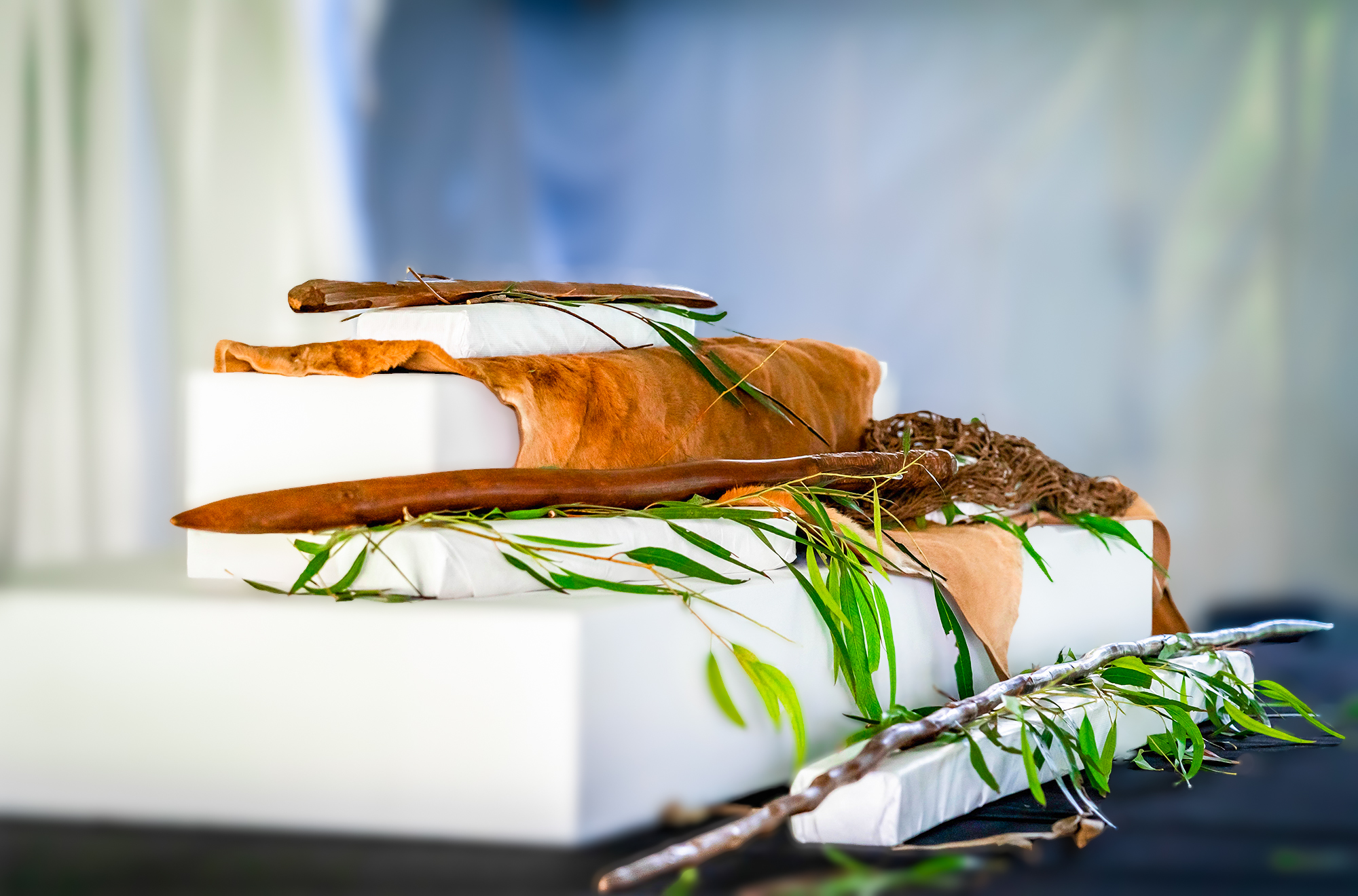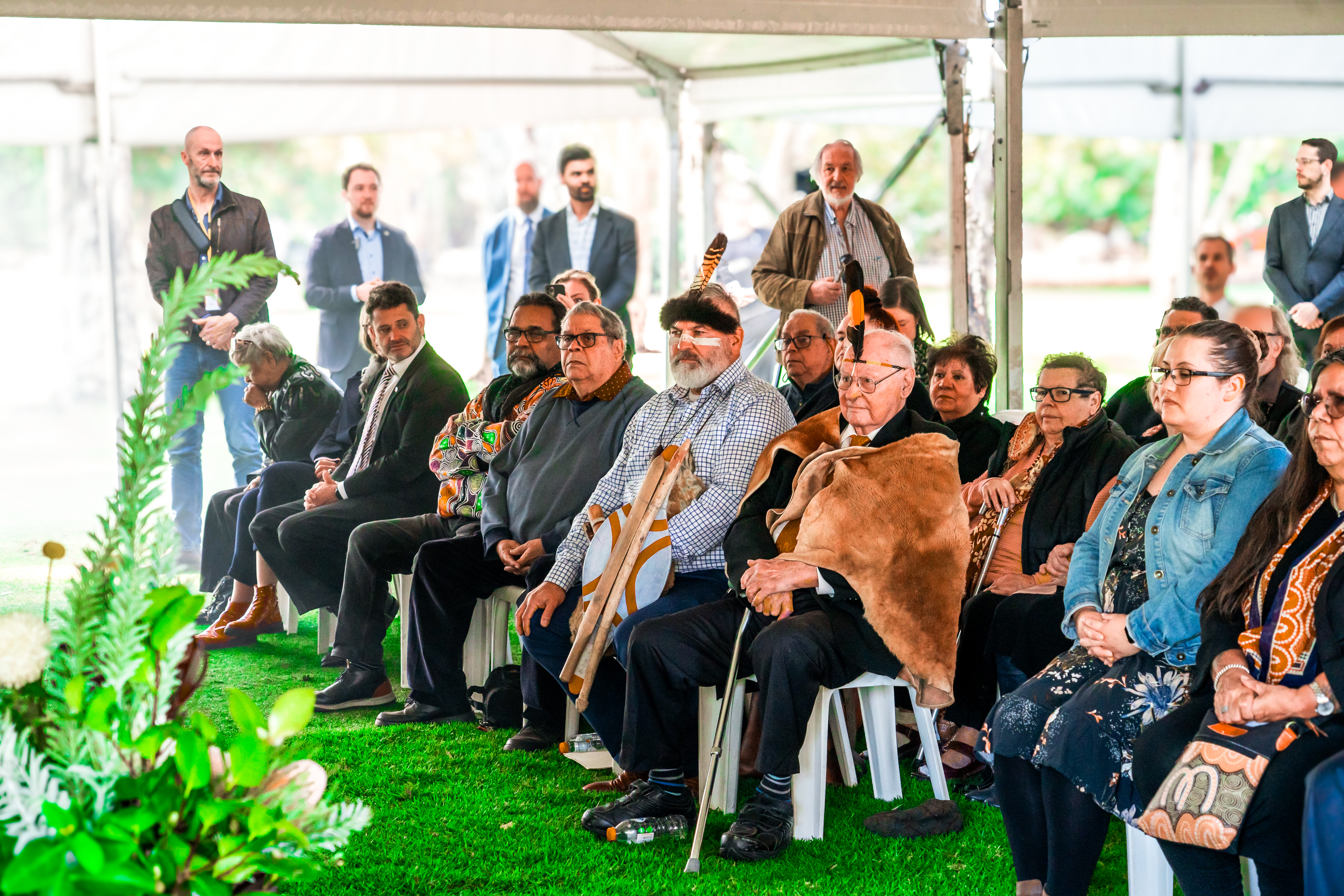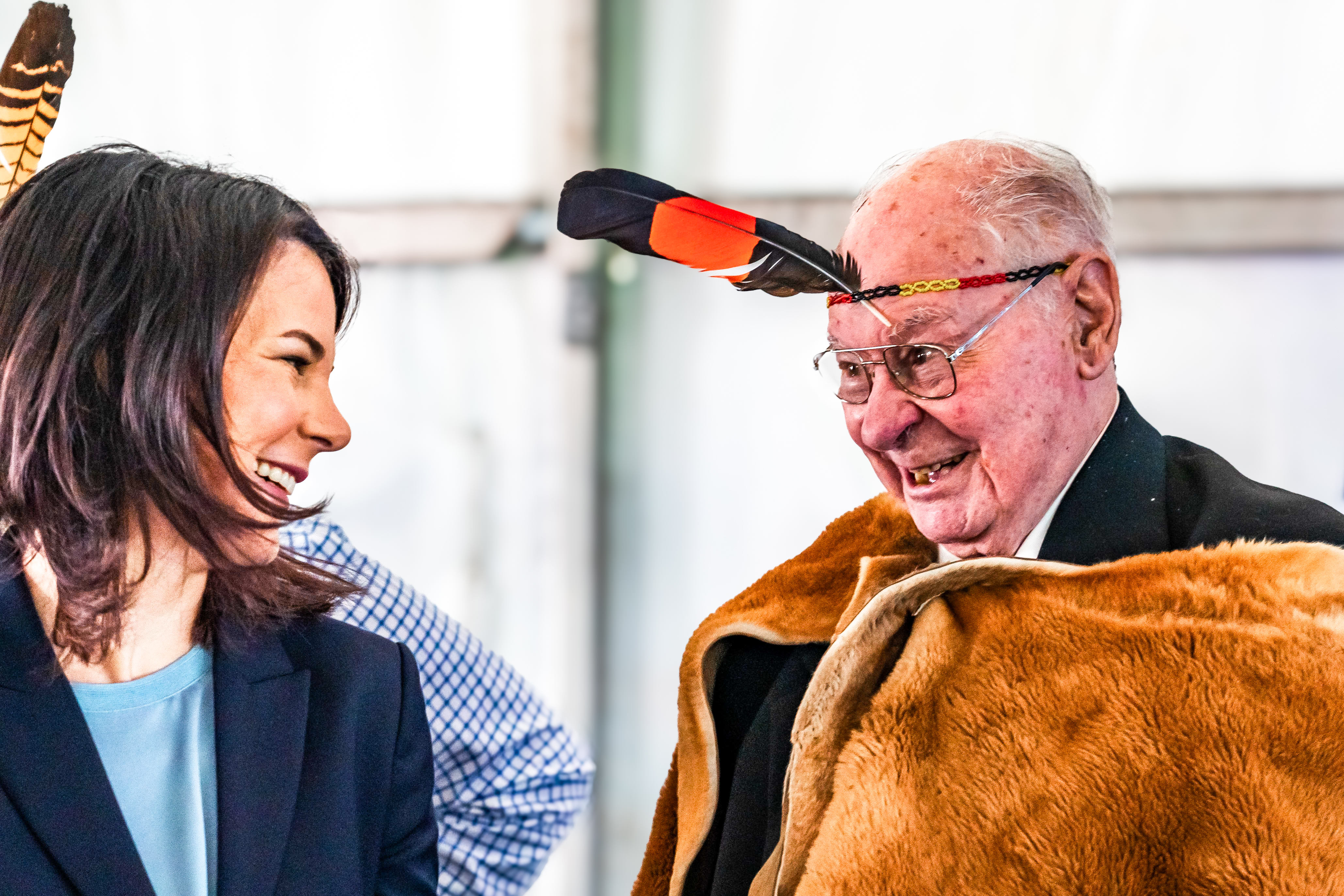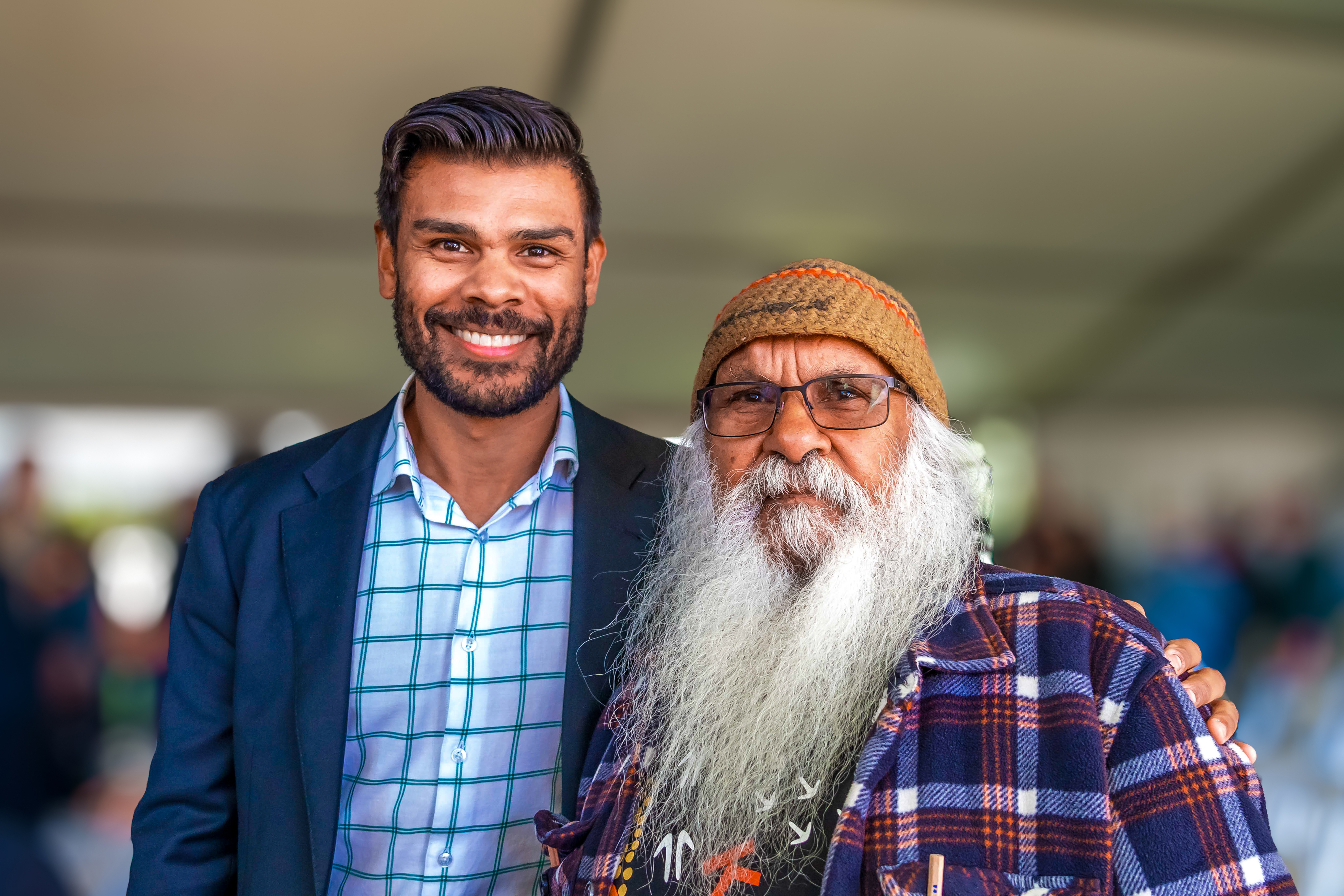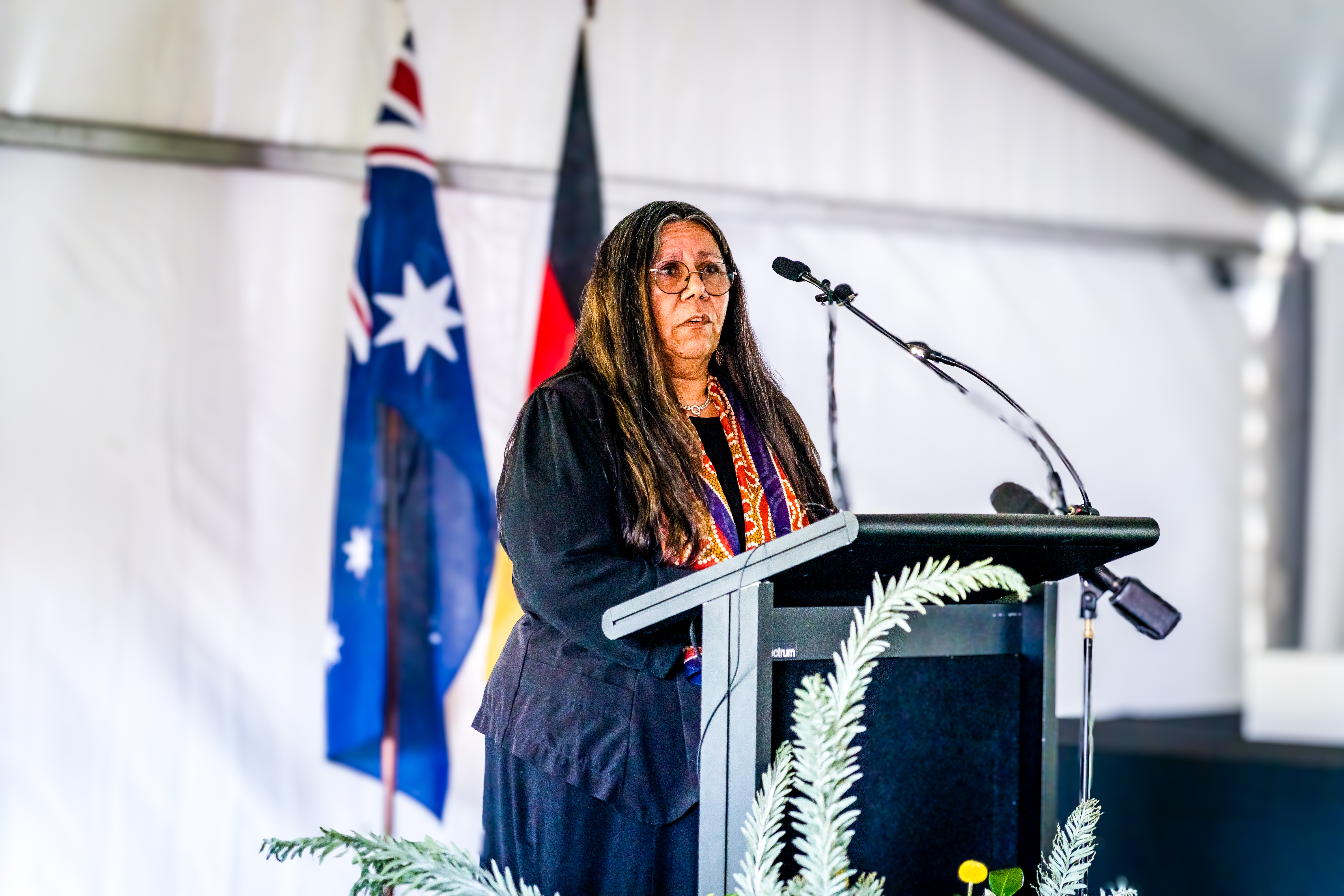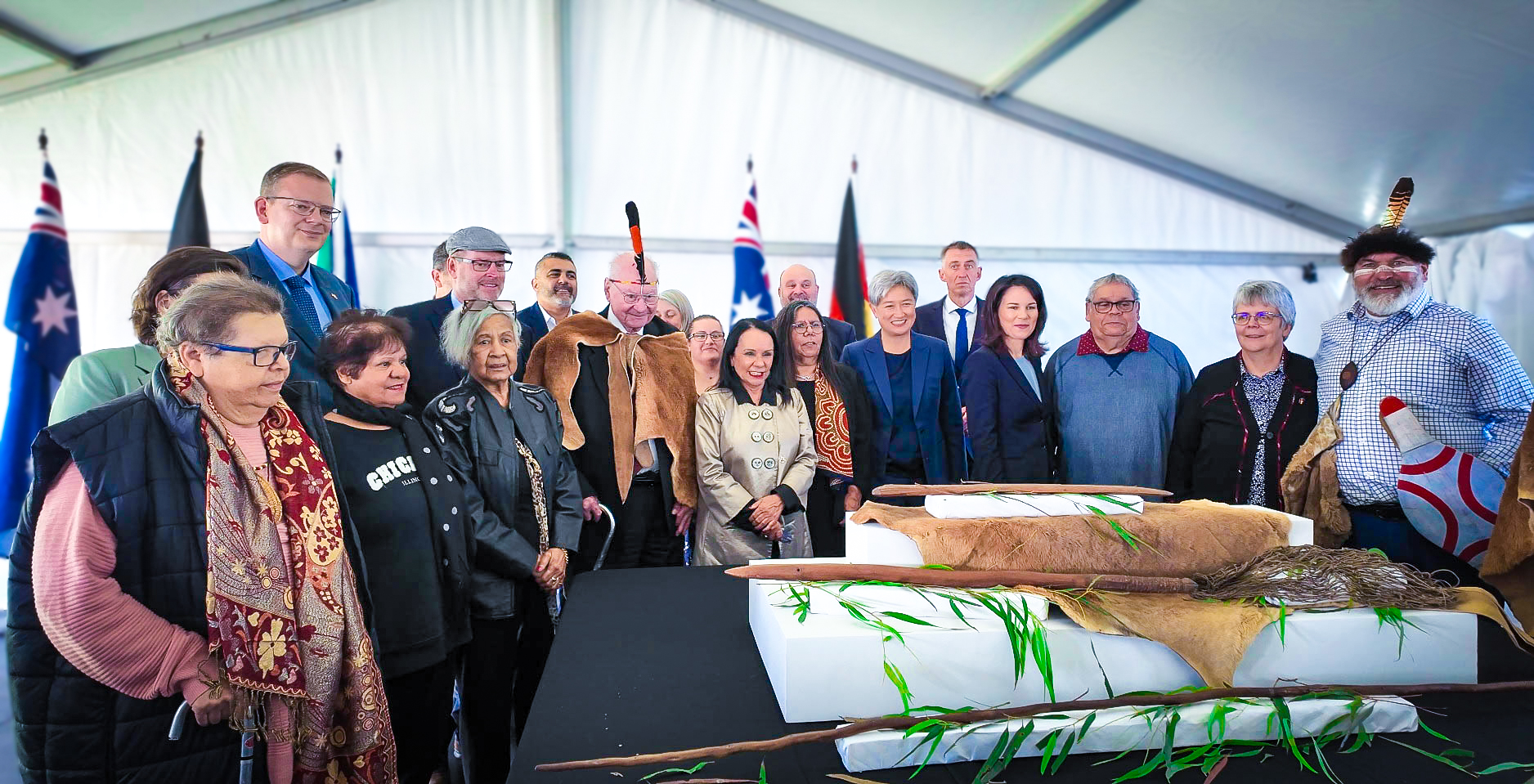Today, the Kaurna Yerta Aboriginal Corporation and the Australian Institute of Aboriginal and Torres Strait Islander Studies (AIATSIS) had the honour of hosting a celebration for the return of four significant cultural heritage items to the Kaurna people in South Australia by the Grassi Museum, Leipzig Germany.
The over 180-year-old cultural heritage items, a kathawirri (sword), tantanaku (club or bark peeler), wirnta (spear), and wikatyi (net) are highly significant for the Kaurna people. They were sent to Germany in 1840 by two Lutheran missionaries. The return event today was held at Pirltawardli (Possum Park), the location of the original exchange between Kaurna people and German missionaries.
The Kaurna people and representatives from the Grassi Museum have been discussing the return since 2019, after an application was submitted by Senior Kaurna man, Michael Kumatpi O’Brien, on behalf of the Kaurna community. In August 2023, the four Kaurna artefacts were welcomed back to Australia by Mitzi Nam, Chairperson of Kaurna Yerta Aboriginal Corporation RNTBC. These items were temporarily stored and cared for by AIATSIS before they were returned to the Kaurna people today.
Annalena Baerbock, German Federal Minister for Foreign Affairs, was present at the return event, highlighting the growing cultural exchange and collaboration between our nations.
The return celebration, facilitated by AIATSIS, is a result of ongoing conversations with the German Government regarding the return of Aboriginal and Torres Strait Islander peoples material held in German collecting institutions.
AIATSIS is Australia’s only national institution focused exclusively on the diverse history, cultures, and heritage of Aboriginal and Torres Strait Islander Australia. Our vision is a world in which Aboriginal and Torres Strait Islander peoples’ knowledge and cultures are recognised, respected, celebrated, and valued.
AIATSIS leads the Return of Cultural Heritage program, which facilitates the return of Aboriginal and Torres Strait Islander cultural heritage material from overseas governments, collecting institutions and private collectors. The program:
- enables Aboriginal and Torres Strait Islander communities to understand where their cultural heritage material is held overseas;
- influences the development of changes to institutional repatriation practices, policy and guidelines; and
- fosters relationships between overseas collecting institutions and Indigenous communities.
This significant material will be temporarily stored and cared for at the Art Gallery of South Australia.
Quotes Attributable:
Mitzi Nam, Chairperson, Kaurna Yerta Aboriginal Corporation (KYAC) RNTBC and Emma Gollan, Secretary, KYAC:
“KYAC and the Kaurna Community are thrilled that these precious items have found their way home. Home to where they were part of the lives of the Kaurna people that created them and where they were such integral parts of our lives. These items may no longer be used in the day to day lives of the living Kaurna people, but they are part of our story, our culture and we share a deep and significant connection with them. Thank you to the German Government and the Grassi Museum for being so willing and open to being part of this journey and celebrating with us. And thank you to AIATSIS for their help in organising the return of these items.
This achievement, this homecoming, is hopefully only the beginning of those pieces of our culture and heritage coming back to Kaurna land. Coming home.”
The Honourable Linda Burney MP, Minister for Indigenous Australians:
“I am thrilled that cultural heritage items have been returned from the Grassi Museum Leipzig to the Kaurna people in South Australia. This event represents a significant cultural exchange and collaboration between our nations. I commend the collaboration between representatives from the Kaurna Nation, the Grassi Museum, the German Government and AIATSIS in making this return possible. Through these acts of respect and recognition, we can foster stronger connections and understanding between Indigenous Australians and our global community. The return of these artefacts is an important step towards healing and honouring the rich cultural heritage of the Kaurna people.”
Senator the Honourable Penny Wong, Minister for Foreign Affairs:
“After almost 200 years, the return of these sacred items honours the voices and heritage of the Kaurna People, bringing dignity and respect to the Traditional Custodians of this land and their ancestors. The return of cultural heritage items is a crucial part of our country’s ongoing journey of reconciliation, it promotes healing and justice. I thank the Australian Institute of Aboriginal and Torres Strait Islander Studies for its vital work, as well as the Grassi Museum in Leipzig and the German Government for its collaborative efforts and partnership.”
Annalena Baerbock, German Federal Minister for Foreign Affairs:
“I feel honoured to witness the return ceremony for these artefacts that are so highly significant to the Kaurna Nation. These artefacts – a sword, a bark peeler, a spear and a fishing net - tell important stories of the ancestors of the Kaurna community.
All people should have access to their cultural heritage and be able to pass it on to their children and grandchildren. This idea is finally guiding us in Germany in our handling of human remains and artefacts in German collections - in a responsible manner and in close coordination with the respective countries and communities of origin. This is also an expression of the active engagement of the German government to come to terms with our colonial past.
It is the first official return of cultural assets from the European continent to Australia as part of the "Return of Cultural Heritage“. I hope that this sends a signal extending beyond Germany. I commend all partners to the successful return that makes proof of the strong cultural bond existing between Germany and Australia.”
Leonard Hill, Interim Chief Executive Officer, Australian Institute of Aboriginal and Torres Strait Islander Studies (AIATSIS):
"This achievement is a result of ongoing discussions and collaboration between the Kaurna people, the Grassi Museum and the German Government. AIATSIS was honoured to be entrusted with the temporary care of this significant material. We recognise the importance of returning cultural heritage material to Aboriginal and Torres Strait Islander peoples to support cultural revitalisation and resurgence. AIATSIS sees this return as the beginning of an ongoing collaboration and is looking forward to continuing our conversations with German collecting institutions.”
Media enquiries:
0428 402 305
Photographs from the event will be available after 3:00pm AEST at the following link.
